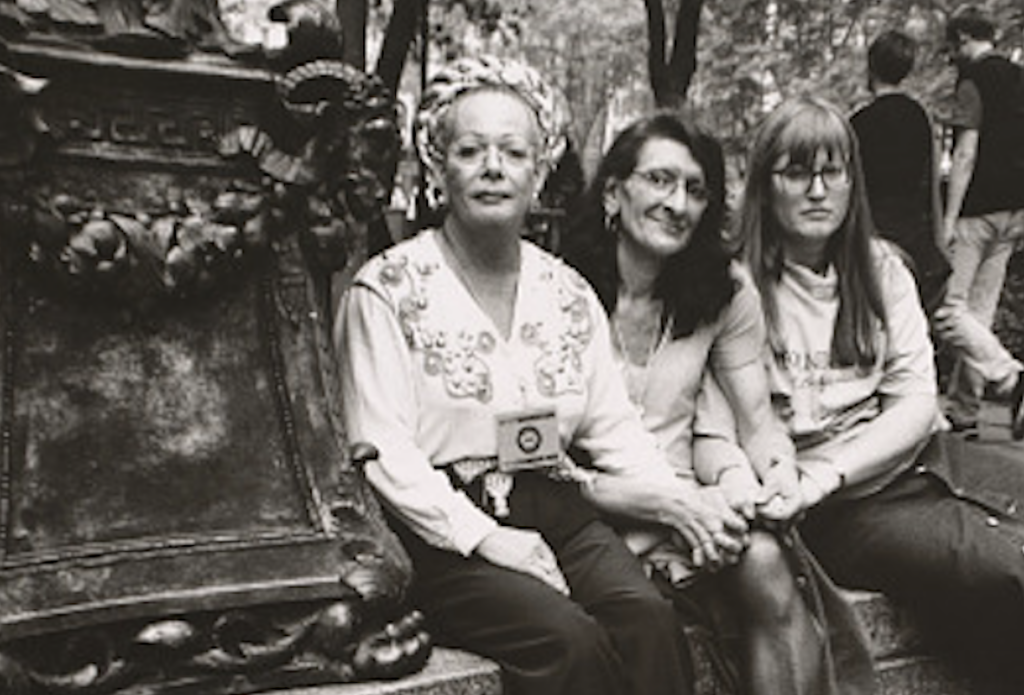By Samy Nemir Olivares, Lambda Legal Public Information Officer
(A version of this story originally appeared on Teen Vogue.)
As a queer, Latinx advocate migrating from Puerto Rico, I have been profoundly inspired by Sylvia Rivera’s legacy. From her perseverance to her trailblazing activism, Rivera deserves all the praise and recognition during Latinx Heritage Month and LGBTQ+ History Month — two coinciding months to honor and remember the people in our communities whose shoulders we stand on today. But, too often as we celebrate observances like these, extraordinary Latinx transgender pioneers like Rivera are left out.
During these awareness months, the people who are usually uplifted possess prestigious college degrees, professional titles, privilege, and money. Rivera — as a Latina, transgender woman, sex worker, and someone who struggled with homelessness, alcoholism and depression — was diminished and forgotten throughout her life. And that invisibilization — of her and other transgender people of color like her — still persists today.
Rivera was born to a Venezuelan mother and a Puerto Rican father in 1951 in New York. She endured a difficult childhood that included her mother’s death by suicide when Rivera was only 3 years old. Rivera was then raised by her grandmother, but faced rejection and disapproval of the way she expressed her gender and wore makeup. By age 10, Rivera was living on the streets and engaging in survival sex work.
Despite her traumatic childhood and marginalization from her own queer community and society, Rivera carved her own path forward to become one of the most transcendental activists of the 20th century and the LGBTQ+ movement; a beacon of resilience, radical vision, and solidarity that shaped and forever changed the DNA of our queer movement.
Rivera is perhaps best known as a key figure in the Stonewall Riots in 1969, alongside Marsha P. Johnson. While this may be what many remember about her, she was also a true pioneer when it came to speaking up and advocating for the rights of transgender people, sex workers, and LGBTQ youth. She was deeply embedded in the struggle against poverty, war, racism, and police violence, as well as in multiple social justice movements like the Young Lords.
After Stonewall, where Rivera and Johnson were key revolutionary voices, transgender people and people of color felt excluded from the main new emerging gay groups such as Gay Liberation Front (GLF) and Gay Activists Alliance (GAA).
Rivera joined GAA briefly, but left disenchanted due to the marginalization of transgender people. Furious about the inequality and discrimination of the early gay movement groups, Rivera, alongside Johnson, created her own group, Street Transvestite Action Revolutionaries (STAR), rooted not only in gender politics, but racial, economic ,and class liberation — a vision not yet adopted by the larger gay movement. STAR was an organization (and later a shelter) for homeless trans and queer youth that, while short-lived, paved the way for other organizations that address LGBTQ+ homelessness and queer advocacy today. Thanks to Rivera and STAR’s legacy, organizations like theThe Sylvia Rivera Law Project and other resources for trans people experiencing homelessness exist..
Rivera’s legacy is perhaps best exemplified by her relentless work to pass civil rights protections for transgender people in New York. She intensified her advocacy in the 1970s with the Gay Rights Bill, becoming the only person arrested in the petition drive. At subsequent protests, she worked to ensure transgender people were not left out from the gay movement’s priorities. When transgender people were excluded from the bill to make it more palatable to straight people, Sylvia and other trans people considered it a betrayal and decided their lifelong mission would be to make it right.
Decades later, on her deathbed, Sylvia summoned the gay leaders of New York’s gay rights group Empire Pride State Agenda (ESPA) and, as part of her last “list of demands,” implored them to include transgender people in the bill, at that point called SONDA (Sexual Orientation Non-Discrimination Act). In 2002, SONDA passed without protections for gender identity and expression.
Perhaps one of the greatest testaments to Rivera’s power is her impact beyond her death: Rivera’s dedication and passionate fight since the 1970s did ultimately lead to the passage of civil rights protections for transgender people in New York in 2019 under the GENDA bill. Inspired by this history and Riveras activism, the trans community came together and created the Gender Expression Non-Discrimination Act, which took 17 years of grassroots advocacy to pass in 2019.
Today, there are thousands of other grassroots activists, organizers, and leaders creating change in their communities and speaking up about inequality among LGBTQ+ people, particularly trans and queer people of color. However, like Rivera didn’t, many aren’t getting the credit they deserve.
I want to uplift Latinx transgender women who have continued the legacy of Sylvia Rivera and others who are no longer with us: Pioneers like Lorena Borjas, Cristina Hayworth and Martixa Vidal; leaders such as Elisa Crespo, Bianey Garcia, Cecilia Gentili, Cristina Herrera, Mariah Lopez, Jennicet Gutierrez, Sofia Sepulveda, Bamby Salcedo, Ana Andrea Molina, Salma Andrews Marmolejo, Arianna Inurritegui-Lint, Isa Noyola, Victoria Rodriguez-Roldan, and so many others.
I often ask myself, “what would Sylvia say or do if she were alive?” In light of the slew of anti-LGBTQ+ legislation today, I believe she would be speaking up, protesting, and fighting so that transgender people and LGBTQ+ youth are not forgotten.
Sylvia’s life is also a lesson to not repeat the mistakes from the past, to better listen, to stand up, and to speak up. Her life should inspire us to build a movement that is more inclusive, intersectional, and diverse. We deserve a movement that uplifts and centers the most vulnerable and marginalized members of our communities, a movement that ultimately is rooted in social, racial, and economic justice for queer people — and all.
Check out more of our blogs here, including recent pieces about National Coming Out Day, Back-to-School season for LGBTQ+ students, and Bisexual+ Awareness Week.

